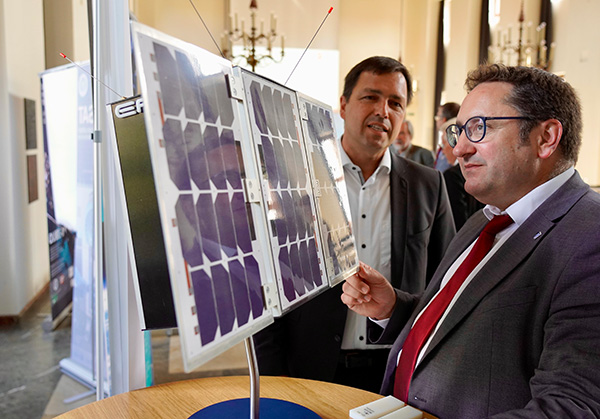Manufacturing small satellites faster and more cheaply
The number of small satellites in low orbits is increasing. The so-called NewSpace market offers high growth potential, but Germany and Europe are still lagging behind in global development. Three Fraunhofer Institutes are currently researching how the versatile small satellites can be produced much more cost-effectively and quickly. The project partner is the Centre for Telematics e.V. in Würzburg. The Bavarian Ministry of Economic Affairs is supporting the research project with funding totalling almost 2 million euros.

As part of the project, which focuses on small satellites for use in extremely low orbits, known as Very Low Earth Orbits (VLEOs), the partners are investigating how different innovative materials, manufacturing processes and coating methods can reduce costs and speed up production. On the other hand, concepts for production-ready manufacturing processes and automated qualification tests are to be researched and developed. All of this is done with a view to possible applications in earth observation and especially for communication applications such as the transition from 5G networks to satellite-based 6G networks with higher data rates and, based on this, an even more powerful ‘Internet of Things’.
‘Fraunhofer is a strong research partner for industry’
‘The research project is an important milestone for the NewSpace sector in Germany, especially for Bavaria. Our research enables small and medium-sized companies to participate in space missions with a manageable financial risk,’ says Dr Frank Schäfer, Head of the Space Business Unit at the Fraunhofer Institute for High-Speed Dynamics.
In addition to the technological dimension, the research project also has an important strategic significance: it will create the basis for in-depth, long-term cooperation between all participating institutions at the NewSpace site in Würzburg. It will be flanked by industrial participation and open up important prospects for the promising NewSpace sector in Bavaria and Germany as a whole.
In addition to the Zentrum für Telematik e.V., the following three Fraunhofer Institutes in Bavaria are involved in the project: the Fraunhofer Institute for Silicate Research ISC in Würzburg and the Fraunhofer Institute for Integrated Circuits IIS in Erlangen. The Fraunhofer Institute for High-Speed Dynamics, Ernst-Mach-Institut EMI, from Freiburg, which now has a branch office in Würzburg, adds its extensive space expertise. The Fraunhofer Institute for Precision Mechanics and Optics IOF in Jena will supply high-quality metal mirrors for the camera.
The project picks up on the trend towards the increased use of small satellites in commercial space travel and aims to make their production more efficient and cost-effective. Particularly in areas such as satellite communications and earth observation in low orbits, small satellites offer decisive advantages over conventional satellites due to their smaller size and lower construction costs. In view of the predicted development that over 90 per cent of newly launched satellites will be small satellites by 2030, this research project is making an important contribution to future-proofing the German NewSpace market and making it globally competitive.
The project at a glance
· Materials and manufacturing processes on the test bench
· Fraunhofer Institutes drive forward the development of the New Space market in Germany
· Bavarian Ministry of Economic Affairs supports the ‘VLEO Demonstrator’ research project with almost two million euros